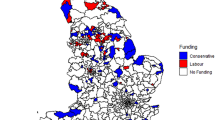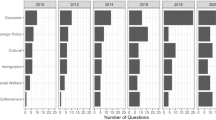Abstract
This paper seeks to develop and test an issue-level determinants model of opinion congruence inequality between the privileged and the underprivileged social groups. Current theories on congruence inequality and representation focus on country-level factors such as the interest group system or campaign finance. The existing literature focuses far less on variation in inequality in preference representation in a single context. To fill this void in the literature, we develop an issue-level model of opinion congruence inequality between the privileged and the underprivileged groups in terms of education and income. Based on an integrated dataset containing the policy positions of parties and voters in Belgium on 229 policy statements, we find that when social groups have different policy positions, preferences in the legislature align more with the preferences of the privileged social groups. In addition, opinion congruence inequality also depends on the importance of the issues to groups: the difference in opinion congruence is larger for economic and tax policies, vital to the privileged groups, but smaller on issues related to social welfare, crucial to the underprivileged groups. Finally, the results show that when voters of a group disagree with their party’s position on an issue, their preferences regarding that issue are less well represented in the legislature.





Similar content being viewed by others
References
Alvarez, R. M. (1998) Information and elections (Rev. to include the 1996 presidential election). Ann Arbor: University of Michigan Press.
Andeweg, R. (2011) Approaching perfect policy congruence: Measurement, development, and relevance for political representation. In M. Rosema, B. Denters, & K. Aarts (Eds.), How Democracy Works: Political Representation and Policy Congruence in Modern Societies (pp. 39–52). Amsterdam: Amsterdam University Press.
Andeweg, R. and Thomassen, J. (2011) Pathways to party unity: Sanctions, loyalty, homogeneity and division of labour in the Dutch parliament. Party Politics 17(5): 655–672. doi:10.1177/1354068810377188.
Beeghley, L. (2015) Structure of Social Stratification in the United States. Boston: Routledge.
Bovens, M. and Wille, A. C. (2011) Diplomademocratie: over de spanning tussen meritocratie en democratie. Amsterdam: Bert Bakker.
Bühlmann, M. and Schädel, L. (2012) Representation matters: The impact of descriptive women’s representation on the political involvement of women. Representation 48(1): 101–114. doi:10.1080/00344893.2012.653246.
Carnes, N. (2012) Does the numerical underrepresentation of the working class in congress matter? Legislative Studies Quarterly 37(1): 5–34.
Coffé, H. (2008) Social Democratic parties as buffers against the extreme right: The case of Belgium. Contemporary Politics 14(2): 179–195. doi:10.1080/13569770802176903.
Converse, P. E. (2006) Democratic theory and electoral reality. Critical Review, 18(1–3): 297–329. doi:10.1080/08913810608443662.
Dahl, R. A. (1989) Democracy and Its Critics. New Haven: Yale University Press.
De Winter, L. and Ackaert, J. (1994) Abstentionnisme electoral et vote blanc ou nul: Le “non-vote” en Wallonie. In A.-P. Frognier & Anne-Marie Aish-Van Vaerenbergh (Eds.), Enquete sur le comportement electoral des Wallons et des Francophones. Brussel: De Boeck.
De Winter, L., Swyngedouw, M. and Dumont, P. (2006) Party system(s) and electoral behaviour in Belgium: From stability to balkanisation. West European Politics 29(5): 933–956. doi:10.1080/01402380600968836.
Depauw, S. (2003) Government party discipline in parliamentary democracies: The cases of Belgium, France, and the United Kingdom in the 1990s. The Journal of Legislative Studies 9(4): 130–146.
Deschouwer, K. (2012) The Politics of Belgium: Governing a Divided Society. Basingstoke: Palgrave Macmillan.
Diamond, L. J. and Morlino, L. (2005) Assessing the Quality of Democracy. Baltimore: Johns Hopkins University Press.
Eveland, W. P. and Scheufele, D. A. (2000) Connecting news media use with gaps in knowledge and participation. Political Communication 17(3): 215–237. doi:10.1080/105846000414250.
Ferguson, T. (1995) Golden Rule: The Investment Theory of Party Competition and the Logic of Money-Driven Political Systems. Chicago: University of Chicago Press.
Flavin, P. (2012) Income inequality and policy representation in the American states. American Politics Research 40(1): 29–59.
Galesic, M. and Bosnjak, M. (2009) Effects of questionnaire length on participation and indicators of response quality in a web survey. Public Opinion Quarterly 73(2): 349–360. doi:10.1093/poq/nfp031.
Giger, N., Rosset, J. and Bernauer, J. (2012) The poor political representation of the poor in a comparative perspective. Representation 48(1): 47–61. doi:10.1080/00344893.2012.653238.
Gilens, M. (2005) Inequality and democratic responsiveness. Public Opinion Quarterly 69(5): 778–796.
Gilens, M. (2009) Preference gaps and inequality in representation. PS: Political Science & Politics 42(2): 335–341. doi:10.1017/S1049096509090441.
Gilens, M. (2012) Affluence and Influence: Economic Inequality and Political Power in America. Princeton, NJ; New York: Princeton University Press; Russell Sage Foundation.
Golder, M. and Stramski, J. (2010) Ideological congruence and electoral institutions. American Journal of Political Science 54(1): 90–106.
Grönlund, K. and Milner, H. (2006) The determinants of political knowledge in comparative perspective. Scandinavian Political Studies 29(4): 386–406. doi:10.1111/j.1467-9477.2006.00157.x.
Hillygus, D. S. (2005) The MISSING LINK: Exploring the relationship between higher education and political engagement. Political Behavior 27(1): 25–47.
Hooghe, M. and Pelleriaux, K. (1998) Compulsory voting in Belgium: An application of the Lijphart thesis. Electoral Studies 17(4): 419–424. doi:10.1016/S0261-3794(98)00021-3.
Jacobs, L. R. and Page, B. I. (2005) Who Influences U.S. Foreign Policy? American Political Science Review 99(1): 107–123.
Jerit, J. (2009) Understanding the knowledge gap: The role of experts and journalists. The Journal of Politics 71(2): 442.
Kern, A., Marien, S. and Hooghe, M. (2015) Economic crisis and levels of political participation in Europe (2002–2010): The role of resources and grievances. West European Politics 38(3): 465–490. doi:10.1080/01402382.2014.993152.
Lau, R. R. and Redlawsk, D. P. (1997) Voting correctly. The American Political Science Review 91(3): 585–598.
Lefkofridi, Z., Giger, N. and Kissau, K. (2012) Inequality and Representation in Europe. Representation 48(1): 1–11.
Lesschaeve, C. (2016) Naar een voorwaardelijk model van ongelijkheid in vertegenwoordiging. Een onderzoek naar het moderatie-effecten van beleidsdomeinen op ongelijkheid in beleidscongruentie. Res Publica 1(58): 59–82.
Lesschaeve, C. and Meulewaeter, C. (2015) Veranderingen in beleidstandpunten en electorale volatiliteit. In K. Deschouwer, P. Delwit, M. Hooghe, P. Baudewyns, & S. Walgrave (Eds.): De kiezer Ontcijferd: Over Stemgedrag en Stemmotivaties (pp. 96–110). Leuven: Lannoo Campus.
Liagre, P. (2012) The Belgian case: an outlier in union density and membership. Presented at the IREC – RN 17 2012 Conference 2012, Lisbon (Portugal).
Lijphart, A. (1997) Unequal Participation: Democracy’s Unresolved Dilemma. The American Political Science Review 91(1): 1–14.
Lippmann, W. (1955) Essays in the Public Philosophy. New Brunswick, NJ: Transaction Publishers.
Martin, L. W. and Stevenson, R. T. (2001) Government Formation in Parliamentary Democracies. American Journal of Political Science 45(1): 33. doi:10.2307/2669358.
Naedenoen, F. (2008) Belgium: A Corporatist Regime. In B. Gazier & F. Bruggeman, Restructuring Work and Employment in Europe. Edward Elgar Publishing. Retrieved from http://www.elgaronline.com/view/9781847205698.00010.xml.
Page, B. I. and Shapiro, R. Y. (1992) The Rational Public: Fifty Years of Trends in Americans’ Policy Preferences. Chicago: University of Chicago Press.
Pitkin, H. F. (1967) The Concept of Representation. Berkely: University of California Press.
Rabinowitz, G. and Macdonald, S. E. (1989) A directional theory of issue voting. The American Political Science Review 83(1): 93–121.
Schmitt, H. and Thomassen, J. J. A. (1999) Political Representation and Legitimacy in the European Union. Oxford: Oxford University Press.
Soroka, S. N. and Wlezien, C. (2008) On the limits to inequality in representation. PS: Political Science and Politics 41(2): 319–327.
Steinbrecher, M. and Seeber, G. (2011) Inequality and Turnout in Europe (SSRN Scholarly Paper No. ID 1901620). Rochester, NY: Social Science Research Network. Retrieved from http://papers.ssrn.com/abstract=1901620.
Strabac, Z. and Aalberg, T. (2011) Measuring political knowledge in telephone and web surveys: A cross-national comparison. Social Science Computer Review 29(2): 175–192.
Thomassen, J. (2012) The blind corner of political representation. Representation 48(1): 13–27.
Ura, J. D. and Ellis, C. R. (2008) Income, preferences, and the dynamics of policy responsiveness. PS, Political Science & Politics 41(4): 785.
Van Der Brug, W. and Van Spanje, J. (2009) Immigration, Europe and the “new” cultural dimension. European Journal of Political Research 48(3): 309–334. doi:10.1111/j.1475-6765.2009.00841.x.
van Gerven, M. and Beckers, M. (2009) Unemployment protection reform in Belgium, Finland, the Netherlands and the UK: Policy learning through open coordination? In Martin Heidenreich & Jonathan Zeitlin (Eds.): Changing European Employment and Welfare Regimes: The influence of the open method of coordination on national reforms (pp. 61–83). New York: Routledge.
van Stekelenburg, J. and Klandermans, B. (2013) The social psychology of protest. Current Sociology. doi:10.1177/0011392113479314.
Walgrave, S. and Lefevere, J. (2013) Ideology, salience, and complexity: Determinants of policy issue incongruence between voters and parties. Journal of Elections, Public Opinion and Parties 23(4): 456–483. doi:10.1080/17457289.2013.810630.
Weekers, K., Maddens, B. and Noppe, J. (2009) Explaining the evolution of the party finance regime in Belgium. Journal of Elections, Public Opinion & Parties 19(1): 25–48.
Weissberg, R. (1978) Collective vs. dyadic representation in Congress. The American Political Science Review 72(2): 535–547.
Winters, J. A. and Page, B. I. (2009) Oligarchy in the United States? Perspectives on Politics 7(4): 731–751.
Wlezien, C. and Soroka, S. N. (2012) Political Institutions and the Opinion-Policy Link. West European Politics 35(6): 1407–1432. doi:10.1080/01402382.2012.713752.
Zaller, J. (1992) The Nature and Origins of Mass Opinion. Cambridge: Cambridge University Press.
Author information
Authors and Affiliations
Corresponding author
Electronic supplementary material
Below is the link to the electronic supplementary material.
Rights and permissions
About this article
Cite this article
Lesschaeve, C. Finding inequality in an unlikely place: Differences in policy congruence between social groups in Belgium. Acta Polit 52, 361–383 (2017). https://doi.org/10.1057/s41269-016-0033-x
Published:
Issue Date:
DOI: https://doi.org/10.1057/s41269-016-0033-x




